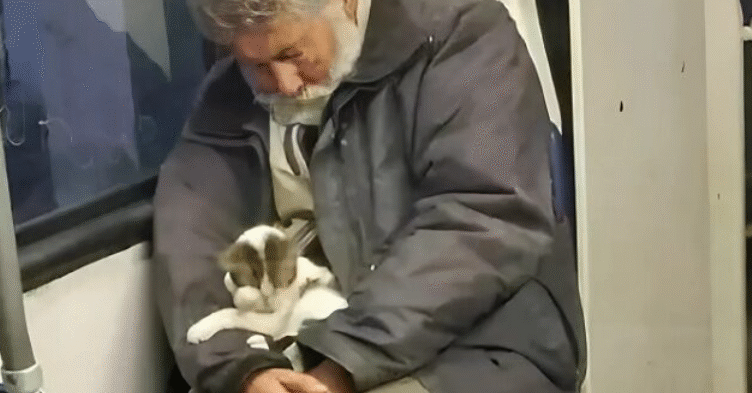Late in the evening, in a subway car on the outskirts of the city, passengers dozing peacefully or staring at their phones were silent. Among them – a man in a worn coat, hunched with fatigue.
At first glance, he didn’t stand out in any way. But what he was holding in his arms made many stop and look.
A small, gray kitten, the size of a palm, curled up on his chest. It was snuggled up to an old scarf, its purring drowning out the clatter of the wheels. The man gently stroked it with calloused fingers, which still held tenderness.
Three days earlier, he had heard a quiet squeak by a garbage can. The little kitten was lying in a puddle, shivering with cold. The man gave it the last bit of his food and wrapped it in his scarf – the only warm thing he had. “I just wanted to keep her warm for a night,” he said. “But in the morning, she didn’t run away – she got under my coat.”
The cat’s name was Mina. The name was written on an old napkin with a note:
“She responds to the name Mina. Please don’t leave her. She’s my mother’s daughter.”
On the back – a phone number.
When the train reached the right station, a girl was already waiting on the platform. She ran out crying, breathing heavily, her eyes full of tears.
“Mina!” she cried and fell to her knees. The cat immediately began licking her face, as if it recognized her.
The girl’s name was Anya. She told me that Mina was the last memento of her deceased mother. Her mother had found the kitten a year earlier and called it her “little angel.” After her mother died, Anya found herself in a difficult situation and had to live in a car for some time. Losing Mina was the final blow to her. She put up ads, hoping for a miracle.
And the miracle happened.
Anya tried to give the man money, but he refused:
“Not for money. I was just keeping her warm.
Later, over a cheap coffee at a gas station, Anya learned that the man’s name was Sylas and that he had once been a mechanic and a volunteer firefighter. He had lost the roof over his head after his wife fell ill, and then his hope. But Mina had changed him.
“She was stealing my shoelaces,” he laughed. “Like she didn’t want me to leave.”
Anya had been volunteering at a shelter founded by her mother. They were looking for someone with technical skills. Sylas had started helping out, and soon he had a permanent job and a small room at the shelter.
A few weeks later, Anya had applied for a grant and established a foundation named after her mother, the Lena Foundation, which helps homeless animals find new caregivers among people in difficult life situations.
Sylas had become the first official caregiver in this project. Now, he not only helps others, but once again feels that his warmth can save someone.
